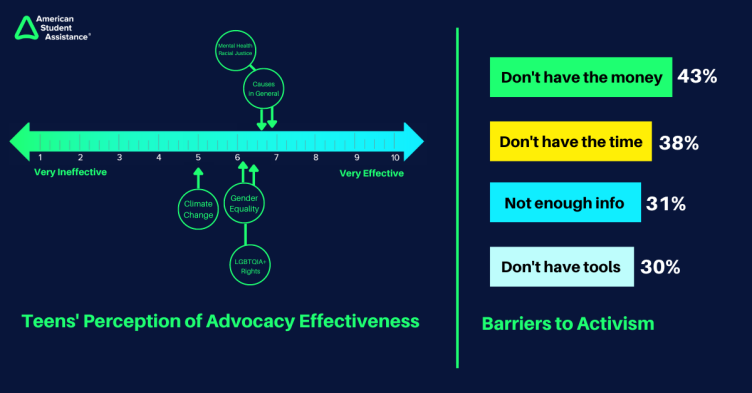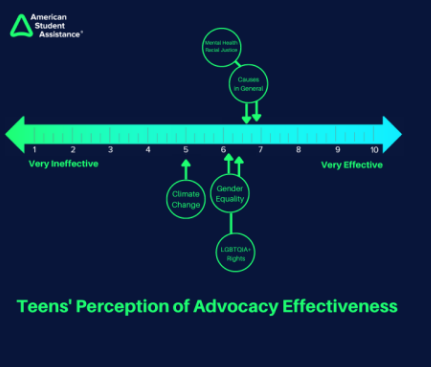American Student Assistance (ASA) recently conducted a quantitative survey of more than 2,000 13-18-year-olds from across the nation to gain insights into Gen Z’s level of confidence in their ability to effectively advocate for various social issues and causes. This included insight into what might inspire more teens to speak out on issues, barriers to participating in advocacy, and the impact of their interest in social causes on career choices.
Here are some of the key takeaways:
- Overall, teens rate their generation’s efficacy at a 7 on a scale from 1 to 10. When it comes to specific issues, teens feel their generation is most effective at advocating for mental health issues and racial justice (6.4 each), gender equality (6.2), and LGBTQ+ rights (6.1). Teens feel their generation is least effective at advocating for climate change (5.0).
- The triggers for teens to get involved come from a variety of sources. Teens see changes in policy and law as the most effective triggers to mobilize teens on issues of LGBTQ+ rights and gender equality, while it takes education and information sharing to engage teens on mental health, racial justice, and climate change issues. Teens most commonly say that more high-profile LGBTQ+ leaders (51%) and female leaders speaking out (50%) will make a difference in addressing LGBTQ+ discrimination and gender equality, while more or different education in school will impact change around mental health (58%), racial equity (55%), and climate change (52%). Teens also feel that more laws protecting LGBTQ+ people, women, and racial minorities will be effective, while more information on social media will be effective around climate change and more high-profile practitioners speaking out will be effective around mental health.
- Not having the financial resources (43%) and the time (38%) to participate in social causes are the top two barriers teens note are holding them back from active participation in causes they care about. Additionally, 3 in 10 teens (31%) say they don’t feel they have enough information or tools at their disposal on how to make change.
One of the reasons this survey is so relevant to the work ASA is doing in career readiness is that the survey also revealed that a quarter of teens say the causes they are interested in have highly influenced their future career choices. On a scale from 1 to 10, teens rate the degree to which their interest in social causes influences their career choice is at a 6, with over 1 in 4 (26%) rating this influence at 8 or above.
It’s clear that today’s young people are very socially aware and want to take a more active role in the conversations happening today that will shape their futures. And while there are clearly barriers to youth participation in activism, it is our job to make sure they have the tools and resources they need to effectively engage. ASA has recently launched a free digital tool to help bridge this gap. Next Voice™ aims to empower youth with the advocacy skills they need to make change. Check it out and let us know what you think.





